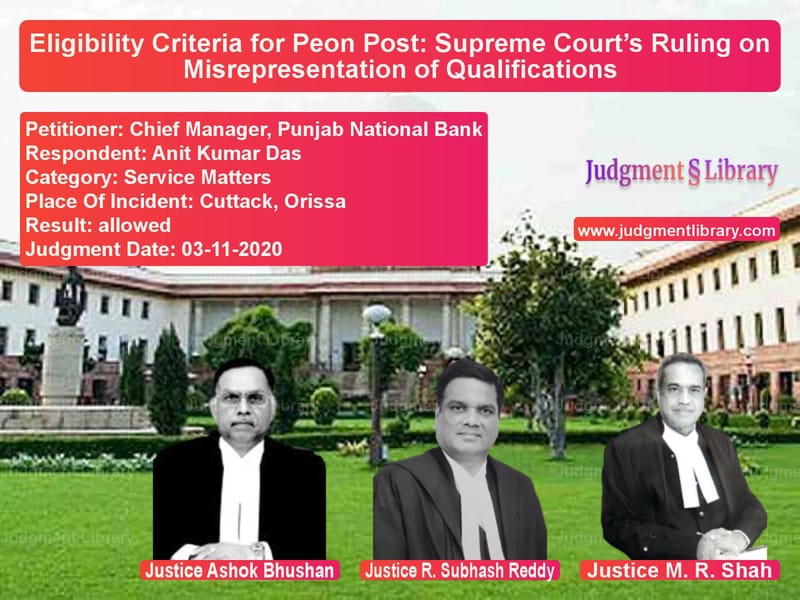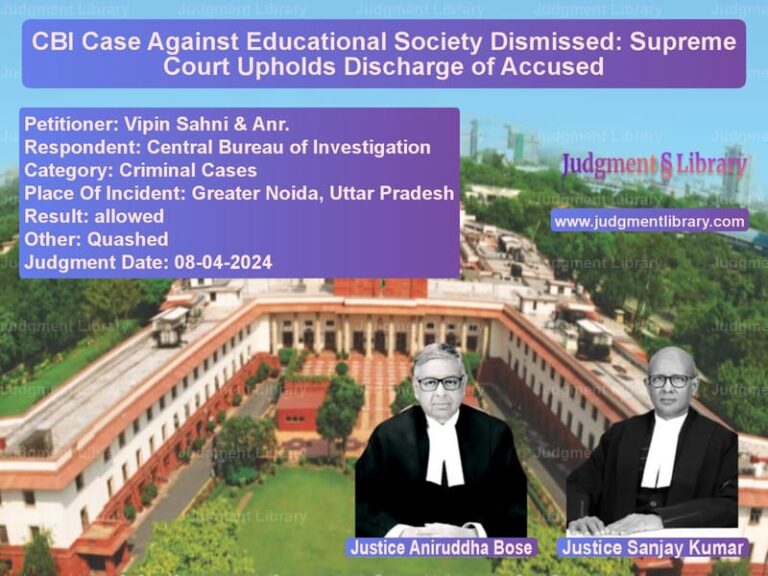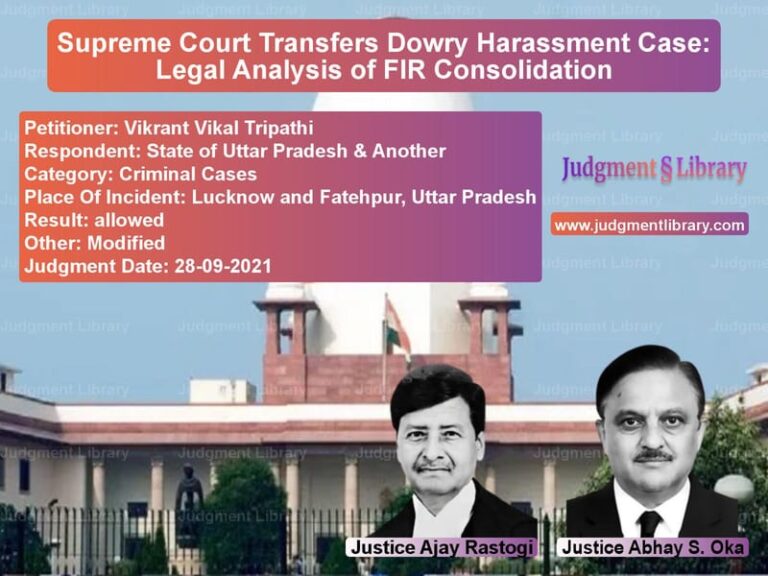Eligibility Criteria for Peon Post: Supreme Court’s Ruling on Misrepresentation of Qualifications
This case concerns a dispute over the appointment of a Peon at Punjab National Bank, where the respondent, Anit Kumar Das, was selected for the position despite being a graduate, which violated the eligibility criteria stated in the bank’s advertisement. The appellant, Punjab National Bank, argued that the respondent had misrepresented his qualifications by not disclosing his graduate status, which led to the cancellation of his appointment. The Supreme Court was called upon to examine the legality of the bank’s actions and the decision of the High Court that allowed the respondent to resume his duties.
Background of the Case
The appellant, Punjab National Bank, issued an advertisement for the position of Peon with specific eligibility criteria that a candidate should have passed 12th class or its equivalent, with basic reading and writing knowledge of English. The advertisement explicitly mentioned that a candidate should not be a graduate as of January 1, 2016. The respondent, despite being a graduate, applied for the position and did not disclose his graduate status in his application or bio-data. Upon scrutiny, the bank discovered that the respondent had been a graduate since 2014, and as a result, his appointment was cancelled for failing to meet the eligibility criteria.
Petitioner’s Arguments
The appellant, Punjab National Bank, argued that:
- The respondent had intentionally suppressed the fact that he was a graduate, which led to his disqualification for the post of Peon as per the eligibility criteria outlined in the advertisement.
- The respondent did not challenge the eligibility criteria or the educational qualification requirements mentioned in the advertisement when he participated in the recruitment process.
- The High Court erred in allowing the respondent to discharge his duties as a Peon, as the respondent’s candidature was rightfully cancelled due to non-compliance with the advertisement’s conditions.
“The respondent deliberately concealed his qualification, which was material to his eligibility, and should not have been considered for the post of Peon.”
Respondent’s Arguments
The respondent, Anit Kumar Das, countered by asserting that:
- The High Court’s decision was based on the understanding that a higher qualification should not automatically disqualify a candidate for a Peon position, as per the Allahabad High Court’s judgment in similar cases.
- There was no legal basis for the bank to cancel his appointment purely because of his graduate status, as it did not constitute a disqualification for the post of Peon.
- The respondent had complied with all other eligibility criteria and had been selected fairly based on his 12th-grade marks.
“The fact that I was a graduate should not have been used as a ground for disqualification, as it was not mentioned as a strict disqualification in the advertisement or the Circulars.”
Supreme Court’s Judgment
The Supreme Court, after hearing both parties, ruled in favor of the appellant, Punjab National Bank. The Court observed the following:
- The eligibility criteria set forth in the bank’s advertisement clearly stipulated that a graduate could not apply for the position of Peon. The respondent’s failure to disclose his graduate status was a material misrepresentation.
- The Court emphasized that the bank had the right to enforce the prescribed eligibility criteria, which had been set consciously in accordance with the job requirements and the nature of the position.
- The respondent’s act of withholding material information regarding his qualification was considered a serious violation of the recruitment process and justified the bank’s decision to cancel his appointment.
- The Court also referred to precedents where the Supreme Court had upheld the employer’s right to prescribe qualifications and where deviations from the stated criteria could not be allowed unless the prescribed rules were deemed arbitrary.
“The employer is entitled to prescribe qualifications for a position, and the courts should not interfere with this process unless the qualifications are patently unreasonable or arbitrary.”
Conclusion
The Supreme Court concluded that the respondent’s appointment was rightly cancelled by the appellant, Punjab National Bank, due to his failure to disclose his graduate status, which was in direct contravention of the eligibility criteria. The judgment upheld the bank’s right to impose strict qualifications for the post and reinforced the principle that applicants must comply with the specified requirements. The Court also made it clear that suppression of material facts by candidates can lead to disqualification, and such actions can have significant consequences in the recruitment process.
Petitioner Name: Chief Manager, Punjab National Bank.Respondent Name: Anit Kumar Das.Judgment By: Justice Ashok Bhushan, Justice R. Subhash Reddy, Justice M. R. Shah.Place Of Incident: Cuttack, Orissa.Judgment Date: 03-11-2020.
Don’t miss out on the full details! Download the complete judgment in PDF format below and gain valuable insights instantly!
Download Judgment: Chief Manager, Punja vs Anit Kumar Das Supreme Court of India Judgment Dated 03-11-2020.pdf
Direct Downlaod Judgment: Direct downlaod this Judgment
See all petitions in Employment Disputes
See all petitions in Workplace Harassment
See all petitions in Public Sector Employees
See all petitions in Judgment by Ashok Bhushan
See all petitions in Judgment by R. Subhash Reddy
See all petitions in Judgment by Mukeshkumar Rasikbhai Shah
See all petitions in allowed
See all petitions in supreme court of India judgments November 2020
See all petitions in 2020 judgments
See all posts in Service Matters Category
See all allowed petitions in Service Matters Category
See all Dismissed petitions in Service Matters Category
See all partially allowed petitions in Service Matters Category







